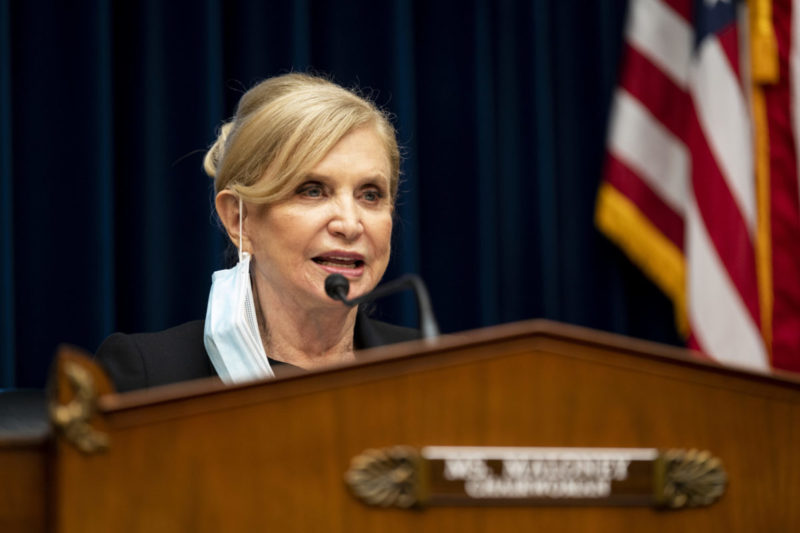Exclusive: Lawmakers Push Ahead With Protecting Birth Control Access
On #ThxBirthControl Day, a Democratic coalition of lawmakers reintroduced the Access to Birth Control Act.

Pharmacies play a critical role in maintaining access to reproductive health care, which is why a Democratic coalition of lawmakers reintroduced the Access to Birth Control Act, which would guarantee people not get turned away at pharmacies when trying to access birth control.
The bill was introduced Wednesday by the following lawmakers: Rep. Carolyn B. Maloney, chair of the House Committee on Oversight and Reform; Sen. Cory Booker; Sen. Patty Murray, chair of the Senate Committee on Health, Education, Labor and Pensions; Rep. Robin Kelly; and Rep. Katie Porter.
Thanks to the Affordable Care Act’s birth control benefit, approximately 64.3 million women in 2020 had coverage of the full range of Food and Drug Administration-approved contraceptive methods without cost sharing. But insurance coverage for birth control doesn’t fully guarantee access to it. Pharmacists in 24 states and the District of Columbia have refused to fill prescriptions for birth control or to provide patients with over-the-counter emergency contraception, according to the National Women’s Law Center.
The ongoing COVID-19 pandemic is also exacerbating issues with birth control access. According to the bill, one-third of women have experienced a delay in accessing their contraception because of the pandemic. Additionally, more than 19 million women of reproductive age live in contraceptive deserts across the country.
Lawmakers introduced the bill to coincide with the annual Thanks, Birth Control Day, which recognizes the progress in contraceptive care available to people around the world.
“I am proud to lead my colleagues in reintroducing the Access to Birth Control Act to ensure patients seeking birth control can access their health care without unnecessary barriers or delay,” Maloney said in a statement to Rewire News Group. “During the Trump administration, some health-care providers—including pharmacists—denied patients care simply based on their personal views. Health-care providers must do their jobs based on science—not ideology—and we cannot let this dangerous trend continue.”
Despite all its resources, the United States has one of the highest rates of unintended pregnancies among industrialized nations. The Access to Birth Control Act is designed to remedy that.
The bill would ensure that folks seeking FDA-approved contraception, including emergency contraception, are able to access it in a timely manner and are not prevented from doing so by a pharmacy, whether because of supply issues or because a pharmacist claims religious objections to dispensing birth control.
“Family planning is basic health care,” the bill states in its introduction.
How the Access to Birth Control Act works
If a particular birth control medication is out of stock, the bill requires pharmacies to either refer the patient to another pharmacy or order the medication, depending on the patient’s preference. The bill also protects patients from being intimidated, threatened, or harassed by pharmacy employees who personally object to the use of contraception.
“Contraception is a protected fundamental right and access to contraception is necessary for people to make and exercise decisions about whether and when to become pregnant,” Dr. Joia Crear-Perry, founder and president of the National Birth Equity Collaborative, said in a statement.
“The Access to Birth Control Act will especially aid in closing the disparities gap for women of color who historically have faced challenges accessing contraception and medication due to systemic racism. Establishing certain duties for pharmacies to ensure safe and equal access to contraception is a critical step in protecting women’s sexual reproductive health and well-being.”
Importantly, patients and consumers would have a remedy if a pharmacy violates these requirements. If that should happen, the bill establishes civil penalties for the pharmacy and a private cause of action for patients to seek relief, meaning patients can sue pharmacies and pharmacists after birth control refusals.
“People’s access to birth control should never be restricted by a pharmacy employee’s personal beliefs,” Fatima Goss Graves, president and CEO of National Women’s Law Center, said in a statement. “We’re glad to support this bill that will make sure everyone can leave a pharmacy with the birth control they need, without discrimination, harassment, or delay. At a time when extremist politicians are trying every way possible to take away our reproductive health care, it’s urgent to secure federal protections like the ABC Act.”
The Access to Birth Control Act is part of an ongoing debate in Congress over just how to address a wide range of reproductive and workplace equity issues, including paid leave and racial disparities in maternal mortality rates.
“Birth control is a vital part of reproductive health care and basic family planning,” said Booker, the bill’s co-sponsor in the Senate. “At a time when reproductive rights are under increasing attack throughout the country, protecting Americans’ access to contraception is more important than ever. The Access to Birth Control Act would ensure that all people not only have autonomy over their health but also have affordable and timely access to birth control.”
Jamie Manson, Catholics for Choice president, pointed out that birth control is a “lifeline used at some point by 98 percent of U.S. Catholics” and that it’s dangerous for a pharmacist to refuse care because of their religious beliefs.
“Refusal compromises a patient’s health, economic security, and moral autonomy—all of which our Catholic social justice values compel us to protect,” Manson said.
CORRECTION: This article was updated to include the names of all lawmakers who reintroduced the Access to Birth Control Act.

